#the writers strike
Text
“If this hurts my shows I’m gonna riot” “they better not cancel my favorite show” “this is so selfish I NEED this show” “what about my mental health now that they—“
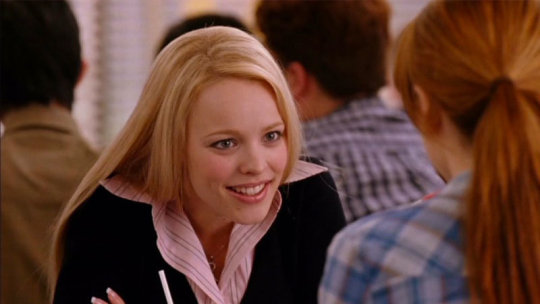
So you agree. Show-writers are important to you and to the industry and should be compensated accordingly for their important work.
88K notes
·
View notes
Text

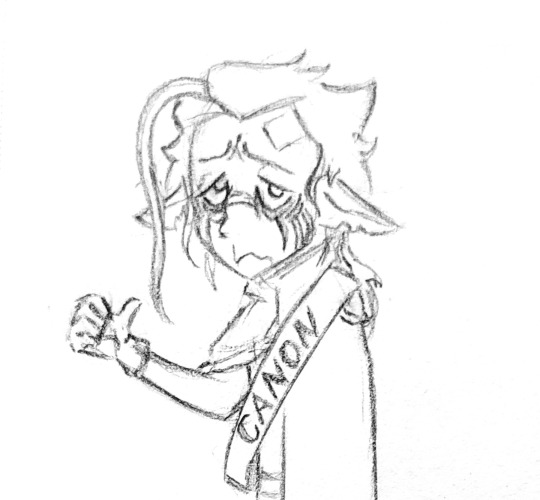
[IMAGE ID: A screenshot of a tweet by Dana Terrace. It's completely blacked out except for the words "sad boy Bob." It is followed by a doodle of Brother's Keeper AU Sad Boy Bob miserably giving a thumbs up. He is wearing a sash labelled, "canon." /END ID]
Wow can't believe Dana mentioned Tragic Youth Robert! Totally wasn't talking about anything else
(The real Sad Boy Bob she's talking about (Bob Iger) is currently part of the gang of robber barons trying to starve and evict striking film and TV workers, and treating people like my sister and me as collatoral damage. Please support the WGA, SAG-AFTRA, and entertainment workers in general as they strive for better conditions!)
#brother's keeper au#doodle art#the owl house#the writers strike#the continued misfortunes of tragic youth robert#very fitting for Sad Boy Bob to only be '''''canonized'''' in the worst circumstances possible lmao#anyway screw Bob Iger the AMPTP and the horse they rode in on
312 notes
·
View notes
Text
Some motherfucker from the suburbs of a big city had the audacity to tell me, a person whose entire family is from a notorious Rust Belt city and who’s uncle still works the night shift at the glass factory, that factory jobs weren’t important in America, and that unions didn’t matter…
Be so serious right now, the bread factory and meat packing factory next to my hometown shut down and the 30,000 people that lived in surrounding towns and worked there, lost their jobs and their livelihoods because the state I live in decided to Union bust like it no tomorrow
The only thing that has protected workers in the Rust Belt is unions, not the government and the state government has been determined to shut down any, and all unions which results in all of the people in places like my hometown losing their jobs.
So your ass, coming from the fucking suburbs of Chicago doesn’t get to tell me that unions and factory workers arent important just because you live in a town where the high school teachers have fucking PhD’s and get paid more than an entire family of generational factory workers. Your lived experience does not hold up to the blue collar towns in states you look down on.
Unions are, and will always be the best and most effect way to protect workers from exploitation and the government and every single human being that has a job benefits from the work of unions in the decades past.
#an unprompted rant because people from the burbs piss me off#I’m so tired of y’all#Open a fucking history book or try to understand that not everybody comes from a rich suburb of Chicago#I am and always will be pro union until the day I die#union workers#pro union#The writers strike#workers of the world unite#Union busting is a human rights violation#Unions#workers rights#rust belt
36 notes
·
View notes
Text
Think about it with the writers strike over Neil Gaiman could be making Ineffable Minions canon right now and were none the wiser!
#ineffable minions#ineffable lackeys#ineffable juniors#good omens#good omens ship child#muriel and eric#eric x muriel#muriel good omens#eric the disposable demon#disposable Constable#the writers strike#neil gaiman#i need them
52 notes
·
View notes
Text
I've already seen people complain about the strike because it means no movie promo and let me just say it loud and clear:
The 👏 strike 👏 is 👏 bigger 👏 and 👏 more 👏 important 👏 than 👏 the 👏 promo 👏 for 👏 your 👏 favorite 👏 gay 👏 book 👏 adaptation 👏
Yes, it's frustrating to think about the promo we could've had. And yes, fair pay and working conditions are far more important than any movie or show could ever be.
Please don't blame the strike. Blame the cartoon-level-of-evil studios who make this necessary in the first place. They want us to get fed up with the strike. Don't give that to them. Stand with the workers, on purpose
#red white and royal blue#red white and royal blue movie#rwrb movie#the actors strike#the writers strike#mandy gives no ducks
17 notes
·
View notes
Text
"the writers strike is going to ruin my favorite show"
THEN YOU SHOULD SUPPORT THE WRITERS GETTING THEIR DEMANDS MET QUICKLY
27 notes
·
View notes
Text
Who else wakes up every day like, have they paid the writers? Have they Released michael sheen???
#when that day comes#and it will eventually come#there are going to be some fireworks#good omens#the writers strike#Michael sheen#good omens s2
12 notes
·
View notes
Text
I'm pretty sure this recent news is just the CW remembering what happened last time they let a Supernatural writer's room ponder ideas over a writer's strike 🙃
One of the execs saw a Castiel meme and they cancelled it immediately
#spn#spn winchesters prequel#the writers strike#can you imagine if the winchester's writers came back and pitched a gay angel??? in this economy???#*cw exec voice* kill it in the cradle#castiel#ladyluscinia
15 notes
·
View notes
Text
Once Upon a Time
An essay about the influence of one of the co-founders of the Writers Guild on Disney’s Cinderella

Disney’s Cinderella is a film obsessed with time. The thrumming of midnight is the most obvious example, but that same tower clock interrupts Cinderella’s opening song, too, as she attempts to convey the possibilities provided by dreaming in “A Dream Is a Wish Your Heart Makes.” “Oh, that clock! Old killjoy,” she complains and goes onto connect it to her position of servitude, explaining how the clock itself orders her around
The vocabulary of “time” saturates the dialogue. The word “time” is mentioned thrice in the prologue alone! Cinderella’s stepmother, Lady Tremaine, is the next to bring up the word. She accuses her step-daughter of having too much “time on [her] hands” that should be put to better use laboring for her and her stepdaughters in the house. Cinderella’s fairy godmother is also clued into the values of time. “Even miracles take a little time,” she remarks. Both surrogate mothers link time to work and production. How much someone can clean up, get done, maintain, and maybe even transform is dependent on the amount and use of their time.
Another kind of time distinct from the labor equation enters the fray at the palace. The prince’s ball is initiated by his father’s insistence that “it’s high time [his son] married and settled down,” so that he can see his grandchildren before he passes (Noticeably the interest of reproduction is an outside pressure rather than a motivation for the Prince and completely irrelevant to Cinderella herself). This ticking “high time” is a biological clock that connects back to the mention in the prologue of the “untimely death” of Cinderella’s father. It sets an enforced window of time between birth and death in which we are given to live fully.
The mice’s working song as they altruistically conceive to construct Cinderelly’s dress for the ball seems to most encapsulate the film’s perspective on time. “Every time she find a minute, that’s the time when they begin it!” Her animal friends complain that any moment Cinderella begins to encounter freedom and selfhood, the stepfamily increases its labor demands on her to claim ownership of that moment in time. Cinderella’s time to dream up solutions to her situation or even to dream up a comforting thought as she endures it is constantly being denied by the demands of her stepmother and stepsisters, who act more like employers than family. They rip away the scraps of leisure time she collects for herself in the same way they rip away her dress, becoming possessive of the scraps they had thrown away only once they see Cinderella making a personal life out of them. The expectation is that her time should only work towards maintaining the order (both in cleanliness and social standings) of the household. A dream may be a wish your heart makes, but with a stepfamily like that, who has time to dream?
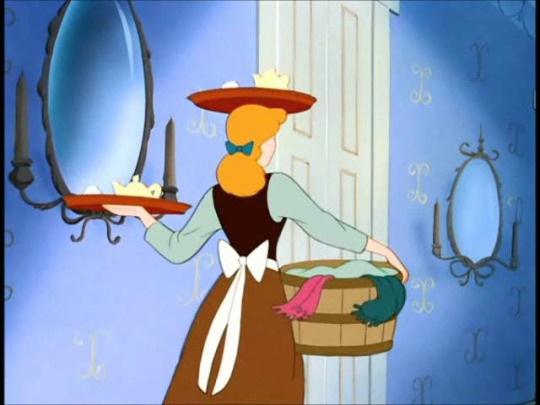
Cinderella in its Time
“We wonder,” activist-poet Gwendolyn Brooks wrote in her poem “kitchenette building,” which was published in her Pulitzer Prize-winning collection A Street in Bronzeville in 1945. It was published only a couple years before Cinderella’s production began. She meant wonder in the same vein that Cinderella dreams, wide-eyed, hopeful, and so often thwarted. “We wonder. But not well! not for a minute!” because “Dream,” she explained, only “makes a giddy sound, not strong like ‘rent,’ feeding a wife,’ ‘satisfying a man.’ The poem demonstrates how the deprivation of time—and the deprivation of resources one can otherwise accrue when given time—deny the lower classes the possibility of even imagining beauty and fantasy into their lives and futures. It creates a permanent relationship to the desperation, disgust, and disappointment that have to be immediately dealt with—garbage in the hall, onion fumes, and lukewarm shower water. Perhaps dreams exist amongst these lives, but no one has the time to notice them and take stock, which means that no one especially has time to transform their dreams into reality.
It’s no stretch to imagine a connection between Gwendolyn Brooks’s work and Disney’s Cinderella. I’ve already mentioned their chronological closeness but there’s also Cinderella’s uncredited screenwriter Maurice Rapf. He was the cofounder of the screenwriters guild (which grew into the Writers Guild of America, the organization currently on strike in 2023. He would later be blacklisted in Hollywood in 1947 due to his association with the Communist Party USA (hence the “uncredited”). He was also brought on, due to his aggressive anti-Uncle-Tom stance, to shape up Song of the South before being pulled from the project after only seven weeks due to disagreements with the infamous lead screenwriter for the film. That a vehement Marxist and antiracist like Maurice Rapf might have more than a passing familiarity with Brooks’s poetry seems more than likely, and it encourages us to read the film more deeply with this kind of lens.
Cinderella’s Histories

It’s well known that the Cinderella story type is an old folktale with versions across a variety of cultures. Disney’s Cinderella draws heavily on Charles Perrault’s French version from 1697. The pumpkin, the fairy godmother, the glass slipper: all Perrault. But the film’s far from a truly faithful adaptation.
Some strange anachronistic names permeate the film. Perhaps you remember the round and adorable mouse, Gus. Do you recall, though, that Cinderella names him Octavius, then christens him Gus for short? Gus, of course, is short not for Octavius but for Augustus. It’s a reference to the Roman emperor who began life with the name Octavius as part of the commoners of ancient Rome, (the plebians) before rising to the highest position of Caesar, receiving the name Augustus and ushering in the Pax Romana, an unprecedented period of peace within the Roman Empire. In the context of the film, his name is used to reference crossing the class barrier to achieve a fairytale happy ending.
Another name, perhaps less unusual, that still beams within a Marxist reading is Cinderella’s stepsister, Anastasia. While of Greek origin, the film pays little respect to its meaning in that language of “resurrection.” It points rather to a notoriously non-Disney princess, instead. The fantasy of Anastasia Romanov’s survival of the Bolshevik Revolution was well established by the time Cinderella was being written. Drawing an even more direct connection, Rapf, whose semester abroad in the USSR in the 1930s (and terrifying visit as a Jew through Nazi Berlin on his way back) inspired his adamant communism. The writers of Cinderella place their Anastasia as one of the stepsisters in a position of power and privilege that harms the laboring protagonist, Cinderella. While it doesn’t direct the stepfamily to a firing squad, through this choice the film refuses to romanticize the Romanovs and the aristocratic class and mindset they represent more broadly.
And They Lived Happily Ever After
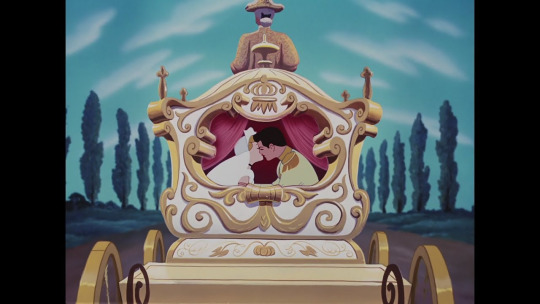
If we take a Marxist reading to be true, then we’re forced to ask the question: why does Cinderella ascend to royalty? The film closes with an image of what is perhaps the most iconic happy ending in the fairytale film genre with Cinderella and Prince Charming riding off in their honeymoon carriage with a final kiss. It replaces Snow White’s castle in the clouds and all its religious allegory for a much more secular conclusion. Logistically, this marriage would bring Cinderella into the fold of aristocracy, but the visuals the animators depict de-emphasize the castle, the class status, and even the ceremony that grants her access to the upper crust.
In the final minute of the film, Cinderella is once again sprinting away from the castle and the king, descending the stairs rather than ascending to a throne. The bells of the clock tower chime away again and the motif of her lost slipper reoccurs, reminding the audience of Cinderella’s urgency, the limited window of time offered to her to find personal freedom. It also provides an opportunity for the king to kneel before her and become her foot servant. Still, she doesn’t remain to take charge of him or the kingdom, she continues her descent away from royalty towards the Public with the person who disregarded class divisions.
Then there’s that final famous image in the carriage, so pervasively symmetrical. A pyramid structure is bordered by natural elements. Then, making the escape from unregulated servitude possible for Cinderella, a laborer, the carriage driver, sits atop the triangle, signaling his power and importance to the narrative’s happy ending. When we transition to the pages of the book that close the film, his person is replaced by a crown.
At the center, Cinderella and her prince consummate their union. From the regulated actions of labor and class, they are escaping into the realm of the carnal. Bodily desires are finally allowed to take precedence for Cinderella instead of the nagging bells that demand she wake up and get to work. The government of Time instituted by the aristocracy on Cinderella as a member of the working class yields to the cries and celebrations of the public and to Cinderella’s own pleasure. “Ever after” is beyond the reach of Time. And, it’s not heavenly like Snow White’s, but in a realm where one is no longer alienated from their own body, its needs and its rhythms.
Back in her rags after her encounter at the ball, Cinderella remarks, “I guess I forgot about everything, even the time…” The discourse around Cinderella has criticized its marriage plot romance, but that romance signifies the ability of connection and union—at the personal level, yes, but also in a socialist fashion—to psychologically and politically help liberate oneself from the many hegemonies that render life unnecessarily laborious, unrelenting, and full of drudgery. Life, when made in partnership with others instead of hierarchies, could feel like a fantasy flying by, like a timeless dream.
9 notes
·
View notes
Note
Well Kenny, JLH, AB didn‘t post vacation pics for example. The people just pointed out that while posting a lot about this vacation, he never posted a single thing of support for the strike. Aisha went on vacations as well. She posts about it, but she also shows up on the picket lines and post support. That‘s the difference….
Okay.
2 notes
·
View notes
Text
So yeah, it's official ... Dune: Part 2 has been pushed back to a March release due to the ongoing labour disputes. Yes, it's REALLY HEARTBREAKING for all us fans who have been waiting so faithfully for all this time ... BUT, at the same time, we have to remember, this is NOT for a shitty reason, this is IMPORTANT, we NEED this delay because this I such a high profile release delay that it's SURE to bring even more attention to a very important cause. So no shitting on SAG/AFTRA or the Writers Guild for "causing" this problem, no abuse or hassling of actors or writers or whoever you might perceive to be to blame (unless you wanna dunk on Disney, which, as always, gets a big GO AHEAD from me, cuz it really IS their fault, at least among others). Work the problem, not the solution, people. And be nice. We're all in this together. And there's still plenty of really choice, already FINISHED stuff inbound before the end of the year to look forward to, so it's not THAT bad ...
#dune part two#dune delayed#the writers strike#the actors strike#sort it out people#but do it respectfully
2 notes
·
View notes
Video
youtube
This felt topical
3 notes
·
View notes
Link
George R.R. Martin is strongly supporting the strike by the Writers Guild of America.
The writers’ strike is on.
No one wanted this — no writer with an ounce of sense, anyway — but the producers and the studios and the networks and the streamers gave us no choice. The Guild negotiated right up to the final deadline on May 1, but it takes two to tango. In the waning hours of May 1, the Writers Guild of America declared a strike. The action began on May 2. There are pickets in front of every studio lot and sound stage in LA, and many in other cities as well. Get used to them. I expect they will be there for a long time.
I am not in LA, so I cannot walk a picket line as I did in 1988, but I want to go on the record with my full and complete and unequivocal support of my Guild.
With the words “my Guild”, GRRM is pointing out that he remains part of the Union. He’s not new to such labor actions. He was once a struggling young writer himself.
I have been through several of these since I first started writing for television and film in 1986. The 1988 strike, the first I was a part of, lasted 22 weeks, the longest in Hollywood history. The 2007-2008 strike, the most recent, went for 100 days. This one may go longer. The issues are more important, imnsho, and I have never seen the Guild so united as it is now.
Writers’ strikes tend to be longer than other labor actions. That’s the nature of the beast.
He seems to be predicting that this strike will last more than the 22 weeks of the late 1980s WGA strike. That would mean well into autumn.
As for how this would impact on his ASoIaF projects...
The writer’s room on A KNIGHT OF THE SEVEN KINGDOMS: THE HEDGE KNIGHT has closed for the duration. Ira Parker and his incredible staff of young talents are on the picket lines. Across the ocean, the second season of HOUSE OF THE DRAGON started filming April 11 and will continue in London and Wales. The scripts for the eight s2 episodes were all finished months ago, long before the strike began, Every episode has gone through four or five drafts and numerous rounds of revisions, to address HBO notes, my notes, budget concerns, etc. There will be no further revisions.
So House of the Dragon Season 2 is done with the writing phase and is in production. No impact there. But Dunk & Egg is on hold for the duration.
There is good news regarding TWOW.
((Some of you, I fear, may be having anxiety attacks just now, on the mistaken assumption that this strike affects WINDS OF WINTER. You can relax. The WGA is a union of film and television writers. It has nothing to do with novels, short stories, or any other form of prose fiction, nor comic books and graphic novels, nor stage plays, nor the editing of collections and anthologies I have on-going projects in all those areas, and that work continues unabated. And WINDS continues to be priority number one)).
So with GRRM’s current TV projects either up to date (HotD) or on hold (D&E), he’ll have more time to devote to The Winds of Winter.
I’m assuming that HotD S3 won’t begin work on scripts at least until production on S2 is complete or nearly so. So it might emerge unscathed.
The important thing is to make sure that writers are paid fairly. It is their work rather than that of greedy study heads and streaming overlords that enriches our lives.
The WGA has a guide for people who wish to lend support to the writers.
STAND WITH WRITERS
How to Support the WGA
Cancelling subscriptions to streamers until the strike is settled is something you can do immediately. When you do, tell them why and let people know you’ve done so.
Here at Tumblr, writer @neil-gaiman frequently posts about the strike and the plight of the writers. He’s worth following for that reason – and many others.
#game of thrones#house of the dragon#dunk and egg#george r.r. martin#the writers strike#wga strike#stand with the wga#gra o tron#ród smoka#isang kanta ng yelo at apoy#la maison du dragon#juego de tronos#jogo dos tronos#a casa do dragão#la casa del dragón#дім дракона#آل التنين#ejderha evi#হাউস অফ দ্য ড্রাগন#בית הדרקון#하우스 오브 드래곤#ड्रैगन का घर#haus des drachen#lohikäärmeen talo#龙之家族#huis van de draak#gia tộc rồng#ڈریگن ہاؤس#дом дракона#σπίτι του δράκου
1 note
·
View note
Text

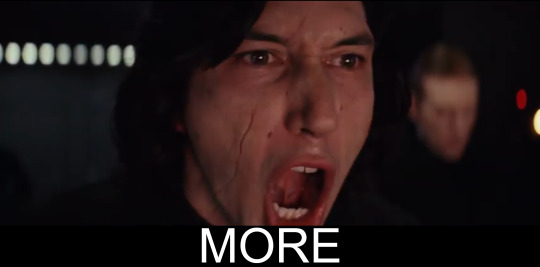
113K notes
·
View notes
Text
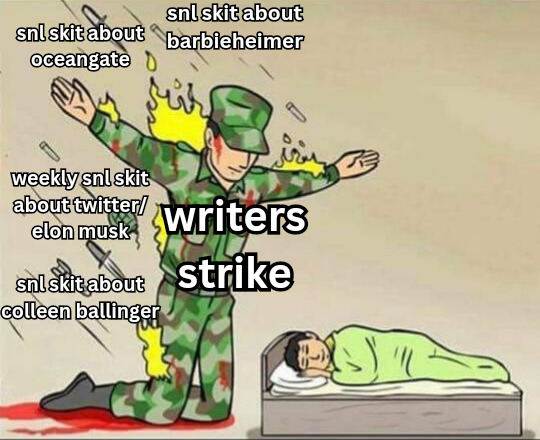
99K notes
·
View notes
Text
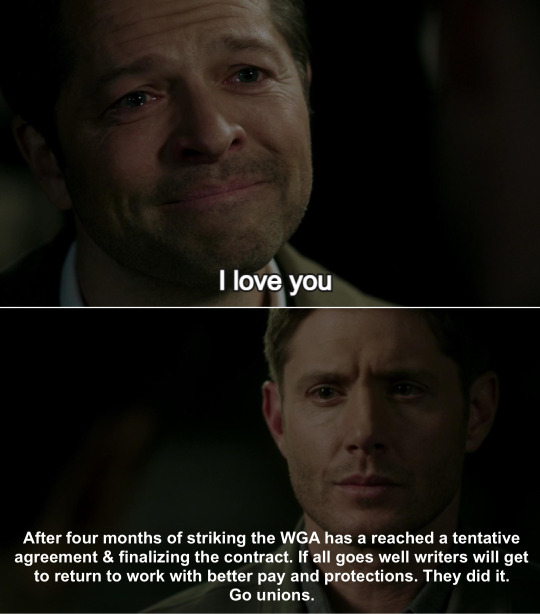
I’m so happy for them
[Image Description: Castiel from Supernatural is saying I love you, underneath is an image of Dean Winchester with the caption: “After four months of striking the WGA has a reached a tentative agreement & finalizing the contract. If all goes well writers will get to return to work with better pay and protections. They did it. Go unions”]
(Source)
#wga solidarity#wga strong#after months of watching union busting and anti union tactics#wga is coming out strong#hopefully sag is next!#writers strike#support unions#wga strike#sag strike#supernatural meme#destiel#destiel meme#workers rights#fuck the amptp#destiel news#mine#we’ve hit the note amount where people start fighting in the notes#stop fighting kids#but also the strike was absolutely necessary#withholding labor is how unions negotiate for better rights#the CEOs are multimillionaires who refused to pay proper wages#they needed to receive heavy losses so they’d actually come to the table listen to union demands
74K notes
·
View notes